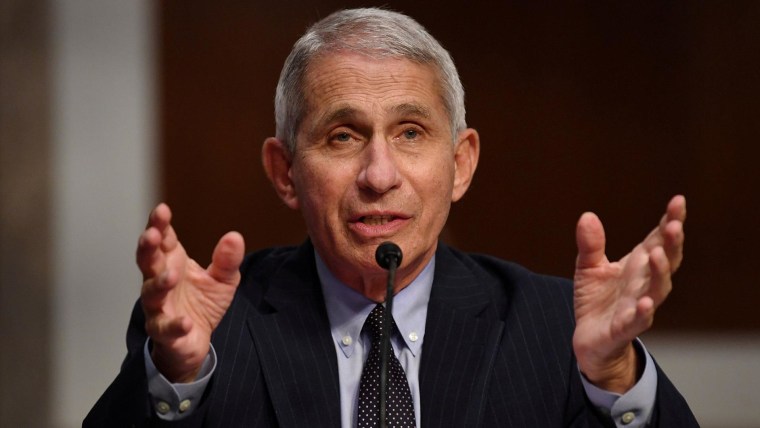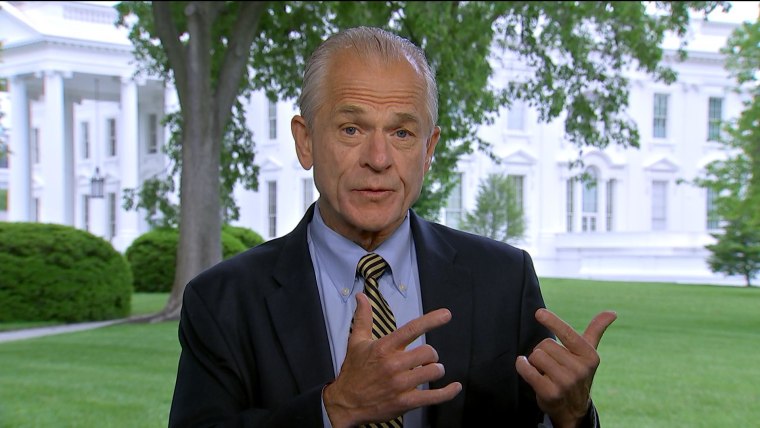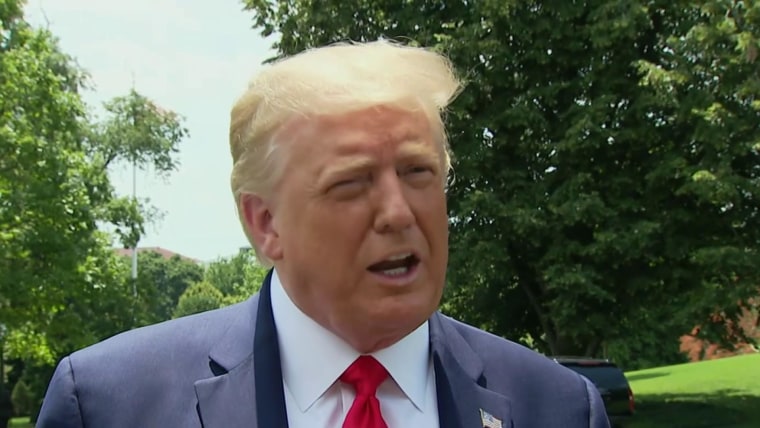If you pay attention to the Trump administration, you’re noticing more of Peter Navarro.
Navarro, a college professor and failed San Diego political candidate who is President Donald Trump’s top trade adviser, is one of the increasingly rare administration officials who has served in the White House since day one of the administration. But it’s the coronavirus pandemic that has allowed Navarro, an avowed China hawk and former protectionist Democrat — who has long been seen as being outside the economic mainstream — to extend his influence far beyond his trade portfolio.
Navarro is now a top coronavirus task force official overseeing the administration’s domestic manufacturing group and implementation of the Defense Production Act, which gives the president broad power to control industries during emergencies.
With that influence, Navarro has become a key defender and promoter of the administration’s coronavirus response. Whether it’s trashing Dr. Anthony Fauci in an op-ed, battling TV anchors over labeling COVID-19 as the “China virus” or suggesting that former national security adviser John Bolton “should be turning in his seersucker suit for a jumpsuit” following the publication of his book, it seems as if Navarro is always itching for a fight.
Full coverage of the coronavirus outbreak
Navarro’s critics say he has no business taking on his increased portfolio, asserting that he lacks the qualifications and experience to oversee an intricate supply chain operation. Others find his bomb-throwing on behalf of Trump to be counterproductive.
“If you leave Peter alone for a few minutes, he’ll get into a fight with himself,” a former administration official said.
Clearly, Trump is a huge fan. The president recently gave Navarro, 71, an approving nickname: “The lobster king,” which he dubbed him while announcing measures to boost Maine’s lobster industry.
The president has often demanded Navarro’s presence in meetings others had sought to cut him out of, former administration officials said. They added that Navarro often butted heads with other officials, sidestepped regular processes and “doesn’t give a f—” what other people think of him, as a former administration official put it.
Andy Surabian, a former White House official, said Navarro has survived for the entirety of Trump’s term “because he is almost an exact reflection of Trump’s views on the issues that are most important to Trump.”
“And so even though I know there have been others who disagree with those views and because of that they don’t like Peter, the ace Peter always has in the back of his pocket is, at the end of the day, his views are Trump’s views,” Surabian said.
Cliff Sims, a former White House official, said: “When the president says do something, Peter just does it. When the president says jump, Peter doesn’t even ask how high. He just jumps through the roof without asking questions.”
Navarro declined to speak on the record for this story.
Navarro’s new job atop the White House coronavirus task force gives him immense power when it comes to procuring medical supplies and negotiating multimillion-dollar orders. Critics have painted him as “woefully unqualified,” as Senate Minority Leader Chuck Schumer, D-N.Y., wrote in April.
On one hand, a number of the actions the Trump administration has pointed to as its coronavirus successes are deals Navarro played a role in, such as acquiring ventilators, masks or swabs. Some of those contracts have come under scrutiny, however, whether it be for potentially overpaying for supplies or doing deals with companies that have connections to the administration.
The most recent such deal that drew both praise and skepticism was with Kodak, which was awarded a $765 million loan under the Defense Production Act to produce pharmaceuticals to lessen reliance on international manufacturers. Kodak’s stock surged by more than 2,300 percent within two days of the announcement, and the company’s CEO, Jim Continenza, had received stock options just before the deal was announced, The New York Times reported.
“I think when people look back on this, this is the beginning of American independence from our pharmaceutical dependence on foreign countries,” Navarro told Fox Business last week. “This project with Kodak is going to be amazing.”
In a statement to NBC News, House Financial Services Committee Chair Maxine Waters, D-Calif., a member of the House Select Subcommittee on the Coronavirus Crisis, questioned lending more than three-quarters of a billion dollars to Kodak, which she called “a failed, broke company that has little experience producing pharmaceutical ingredients.”
“I will be keeping a close eye on how these funds are used and will seek information on whether and how this transaction helps the United States combat the coronavirus pandemic,” she said. “It is vital that the funds allocated by Congress to boost production of critical medical supplies are used accordingly and not for a personal political agenda.”
Navarro is also one of the administration’s hydroxychloroquine boosters — pitching a drug that the administration it is now sitting on after having ordered millions of doses to potentially distribute from the National Strategic Stockpile. Multiple studies have disputed claims of the drug’s efficacy when paired with other antiviral drugs. Fauci has pointed to such studies in saying that it has “consistently” been shown not to be effective in treating COVID-19.
Navarro has pointed to other studies as the basis of his backing of hydroxychloroquine, telling CNN that as a Harvard Ph.D., he understands “how to read statistical studies, whether it’s in medicine, the law, economics or whatever.”
Fauci has often found themselves on the opposite side of the coin from Navarro, and it was Navarro who launched the Trump administration’s biggest broadside at him. After the White House provided reporters with a list of things it said Fauci had gotten “wrong,” Navarro claimed in a USA Today op-ed that Fauci “has been wrong about everything I have interacted with him on” and that he takes Fauci’s advice only “with skepticism and caution.”
USA Today later attached an editor’s note to the column saying several of Navarro’s criticisms were “misleading or lacked context.”
Fauci, director of the National Institute of Allergy and Infectious Diseases, told The Atlantic soon afterward that Navarro is “in a world by himself.” Trump would later say Navarro “shouldn’t have been doing that.”
It was reminiscent of an earlier episode in Trump’s term when Navarro said there was a “special place in hell” for Canadian Prime Minister Justin Trudeau — comments he was later made to apologize for.
Navarro’s confidence in his coronavirus analysis, whether it be about a vaccine or about criticizing Fauci, is founded upon his being the first top White House official to have offered a stark warning about the pandemic after he wrote in a memo in late January that the U.S. was at risk “of a full-blown pandemic.” Navarro also touts his years-old prediction that such a pandemic would originate in China.
The flame-throwing is nothing new to those who worked on Navarro’s San Diego campaigns. But to those who know Navarro from his time as an anti-development crusader and pro-environment Democrat, what they’re seeing today is a bit of a surprise.
When Navarro joined the Trump campaign in 2016, “everybody I knew in San Diego just turned upside down — nobody could figure it out,” Lisa Ross, communications director for Navarro’s 1996 congressional bid, said in an interview.
She said Navarro’s educational background and media persona may be appealing to Trump.
“He gets on there, he’s the king of sound bites,” she said. “He used to be a lot more fun than he is. He’s really snarly now.”
The president first noticed Navarro through “Death by China,” a 2011 book he co-wrote as part of his yearslong anti-China crusade. Navarro joined Trump’s campaign and then the White House, where he remains a steadfast proponent of the president’s trade agenda.
Download the NBC News app for full coverage and alerts about the coronavirus outbreak
Navarro’s new perch atop the coronavirus task force gives him a unique opportunity to advance his protectionist economic agenda. Lori Wallach, director of Public Citizen’s Global Trade Watch, praised Navarro’s “Buy American” push and his work on U.S. supply chains.
“He has had as much impact in stopping bad things, which thus never are known, as in launching initiatives,” she added.
A second former administration official said Navarro “certainly isn’t a person with a light touch,” adding that Navarro is “polarizing” because he “doesn’t play the D.C. and Washington game.”
“But when you’re going against the establishment orthodoxy, you sort of have to be a bare-knuckled brawler,” the ex-official said.
The officials see Navarro sticking around the administration through the end.
“And I would also bet that the day after the administration is over, he’ll be on a plane back to California and probably won’t step foot in Washington, D.C., again,” said Surabian, the former administration official.
“There are definitely folks in the administration who probably aren’t the biggest fans of him,” he added, “but … the reason they’re not fans is because he’s not afraid to call bull—- right to some of those people’s faces.”














